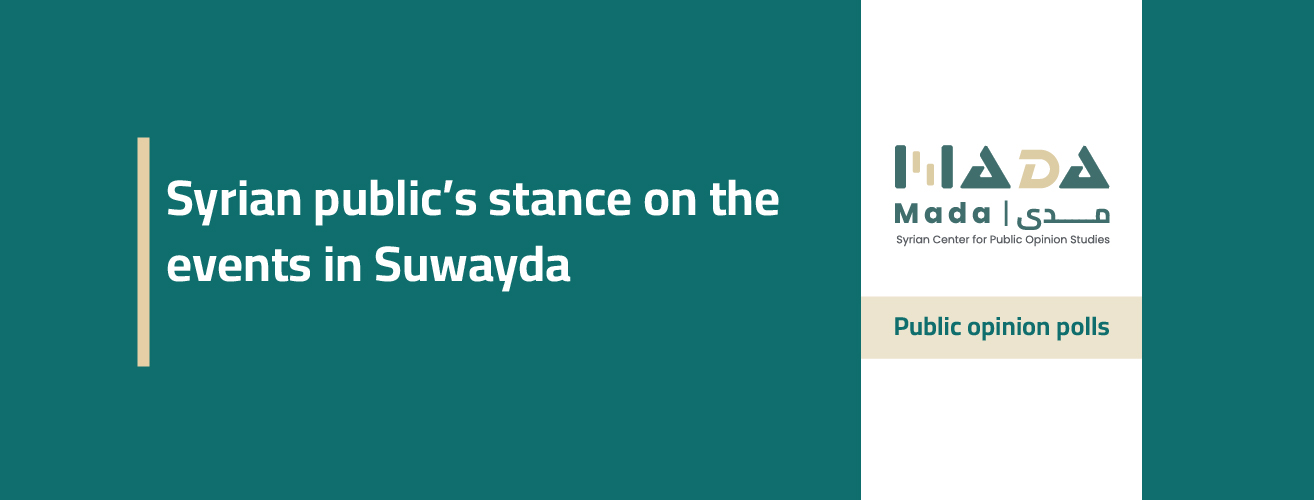Syrian Center for Public Opinion Studies (Mada).
24/07/2025.
The Syrian Center for Public Opinion Studies (Mada) issued a report monitoring the Syrian public’s opinion on the clashes that took place in Suwayda Governorate in recent days, which sparked a crisis of sectarian violence on the ground and across digital platforms. The report aimed to gauge the Syrian collective opinion on who is responsible for this bloodshed, the Syrian people’s stance on the government’s handling of such crises, and the responsibilities entrusted to it in achieving security and stability.
Titled “The Syrian Public’s Stance on the Events in Suwayda,” the report included the views of a sample of 1,950 respondents, half of whom were female, from 13 Syrian provinces (excluding Suwayda). Mada’s field researchers collected data over four days, from July 18 to 21.
According to the survey results, Syrians were more inclined to believe that the underlying cause of the clashes and confrontations in Suwayda was an Israeli plan to ignite conflict among Syrian societal components, with 43.5% holding this view. Meanwhile, a third of respondents blamed Druze military militias that were not formally part of the official military and security institutions at the time of the clashes, along with related attacks on public security personnel.
The majority of Syrians (80%) viewed the events in Suwayda—including the actions of armed Druze militias, their clashes with Syrian security forces, and the shifting stances toward signed agreements before their violation—as calls for secession from Syria. This perception was reinforced by the Druze spiritual leader in Palestine urging military intervention in favor of the Druze, followed by Suwayda’s Druze leader Sheikh Hikmat al-Hijri calling for international protection. The situation escalated further with Israel’s airstrikes on sensitive government sites in central Damascus.
On the other hand, 63% of Syrians believed that the civilian Druze population in Suwayda Governorate—given their suffering under the Assad regime and its militias throughout the Syrian war, as well as their resistance to forced conscription—remains committed to the national cause and rejects separatist tendencies. They viewed the Syrian Druze community as supporting national unity through integration into the new state, socially, economically, and militarily.
Regarding the involvement of Syrian tribes in the Suwayda military confrontations, nearly two-thirds of surveyed Syrians believed tribal intervention was motivated by traditional tribal solidarity “Fazaa” with Suwayda’s Bedouin communities. Approximately 27% viewed the tribes as assuming the Syrian state’s role in these clashes.
Syrians perceived the government’s erratic response – allowing tribal interference and being drawn into an avoidable trap in Suwayda – as grave errors. Consequently, 55% of respondents concluded the government mishandled this crisis.
Overwhelmingly, Syrians supported removing random weapons from circulation outside state control, activating local reconciliation committees, involving communities in managing their regions, ensuring displaced persons’ return to their towns and villages in the governorate, holding all violators accountable regardless of affiliation, and reasserting state authority over all Syrian territories. However, officials at the “Mada Center” maintained that extending state control over all territories primarily requires initiating a comprehensive political and social dialogue encompassing all Syrian components and political factions. This would reestablish shared national vision through transitional justice mechanisms while prosecuting all perpetrators of violations during the Syrian revolution period – including those responsible for abuses in coastal areas and Suwayda.
To read the report, click here

